Key takeaways:
- Performance anxiety affects both seasoned and beginner artists, often marked by self-doubt and fear of judgment, which can be transformed into excitement with the right mindset.
- Strategies such as visualization, breath control, and open conversations about fears can effectively manage anxiety and enhance performance quality.
- Creating a supportive environment through encouraging peers and a welcoming venue significantly diminishes anxiety and fosters a positive performance experience.
- Personal experiences illustrate that focusing on the shared joy of music and community connection can shift the perspective from fear to exhilaration during performances.
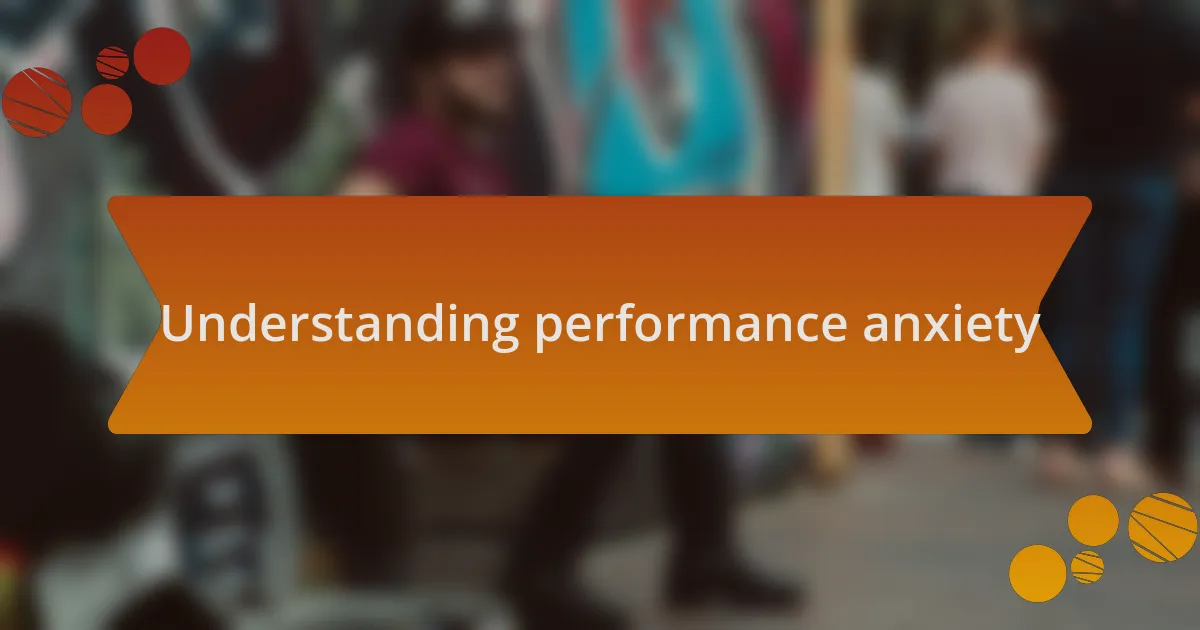
Understanding performance anxiety
Performance anxiety is a common experience that many performers face, often manifesting as a mix of nervousness and fear of judgment. I remember my first time on stage; my palms were sweaty, and my heart raced like a drum. Those feelings can often be overwhelming, making it hard to focus on the music rather than the crowd.
What’s fascinating—and a bit perplexing—is how performance anxiety can strike even seasoned artists. There’s this nagging thought in the back of your mind: “What if I forget my lyrics or miss a note?” I’ve found that recognizing these feelings is important; it helps to remind myself that vulnerability is a part of sharing my art. The audience often wants to connect, not criticize, which can shift my perspective in those moments of doubt.
Interestingly, performance anxiety isn’t always detrimental; it can sometimes fuel creativity and energy on stage. Have you ever experienced that adrenaline rush that accompanies fear? For me, harnessing that energy turned anxiety into excitement, transforming a nerve-wracking moment into an exhilarating performance. Understanding this duality can help performers not only cope but thrive in high-pressure situations.
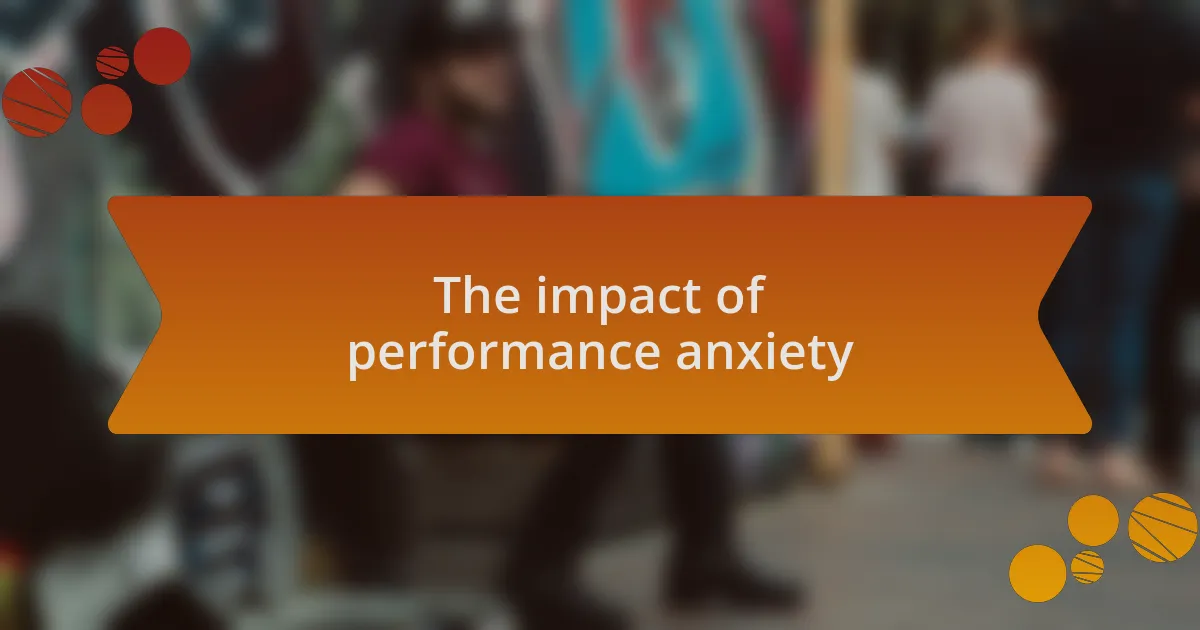
The impact of performance anxiety
The impact of performance anxiety can be profound, affecting both the mind and body. I vividly remember one night when the fear of forgetting my set list hit me hard. My hands trembled, and I could feel my throat tightening; it was as if my body was conspiring against me right before I stepped onto the stage.
This anxiety can lead to a cycle of self-doubt that’s tough to break. I often thought, “What if I stumble on stage?” This relentless worry not only hampers my concentration but can also prevent me from giving my best performance. It’s a relentless battle between my passion for music and the fear of not living up to my own expectations.
However, I’ve realized that acknowledging these feelings is the first step towards overcoming them. Sometimes, I take a moment backstage to remind myself why I love performing. That simple acknowledgment transforms anxiety from a crippling force into an energy I can channel, which ultimately enhances my connection with the audience. Isn’t it amazing how reframing fear into motivation can change the entire performance experience?
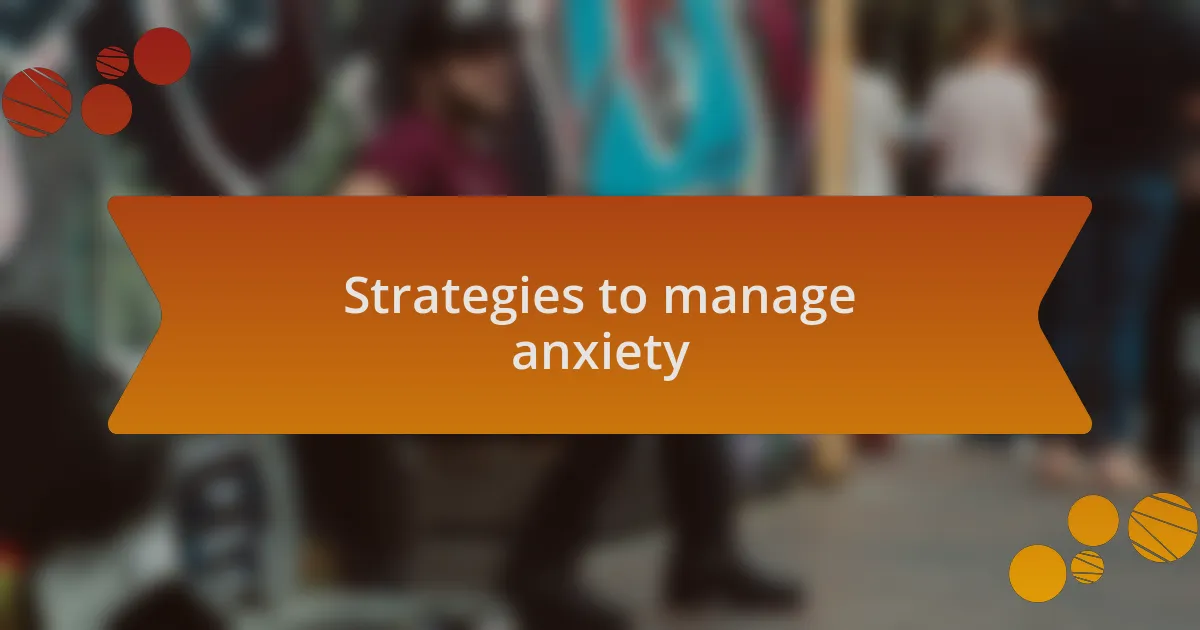
Strategies to manage anxiety
When I feel anxiety creeping in, one strategy I find incredibly helpful is visualization. I take a minute to close my eyes and picture myself on stage, not just performing, but thriving. I can almost hear the cheers of the crowd and feel the rhythm pulsing through me. This technique helps transform uncertainty into a familiar scene, making it easier for me to step into that moment when it’s real.
Another method that has worked wonders for me is breath control. It’s simple, yet effective. I focus on taking deep, measured breaths, inhaling through my nose and exhaling slowly through my mouth. When I do this right before a performance, I can feel the tension melt away. I often think, “Why didn’t I do this sooner?” It’s as if I’m giving my body a gentle reminder that I’m in control, not the anxiety.
Lastly, I’ve found that talking about my fears can significantly reduce their power. Before shows, I sometimes have candid discussions with fellow musicians about anxiety. Sharing those vulnerable moments not only strengthens our connection but also reassures me that I’m not alone in this struggle. Have you ever felt that sense of relief after voicing your worries? It’s a collective understanding that brings comfort and allows me to embrace the performance with renewed confidence.
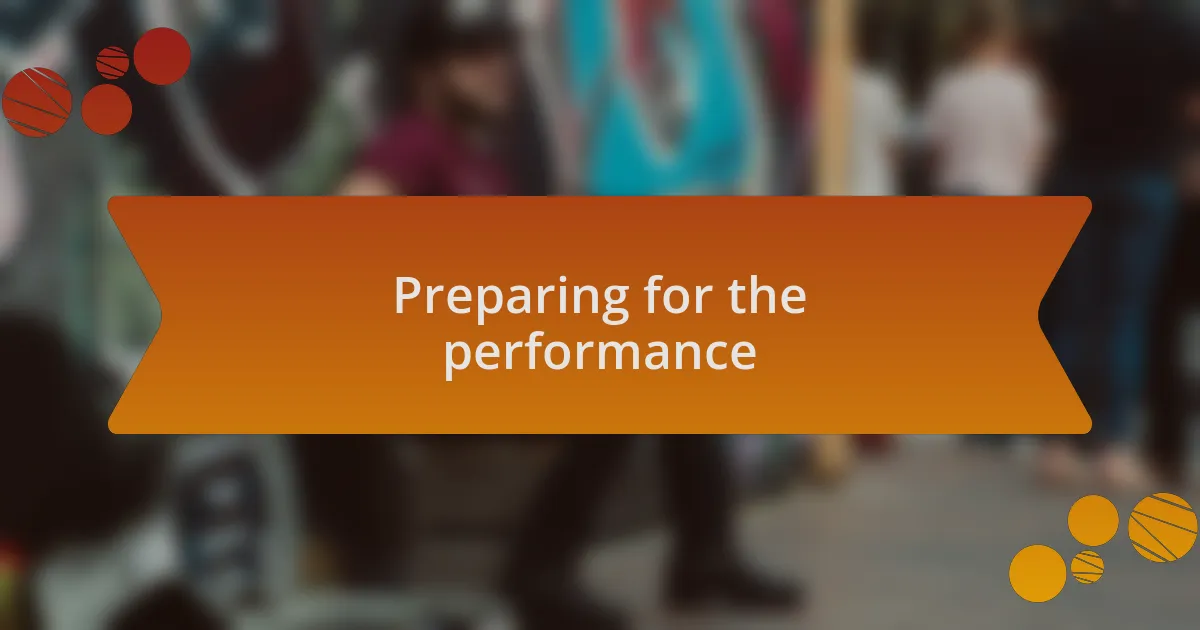
Preparing for the performance
Preparing for a performance often starts with setting the right environment. I have a little ritual where I arrive at the venue early, giving myself time to acclimatize to the space. I usually walk around, taking in the vibe and imagining how the audience might react. This pre-show exploration calms my nerves and helps me feel more connected to the place where I’ll soon share my music.
Another strategy I find effective is creating a warm-up routine that I stick to before every show. I remember one night, feeling particularly anxious, I focused on a few vocal exercises that I’ve used countless times. Just going through those familiar motions allowed my muscle memory to kick in, providing a sense of comfort and readiness. Have you ever experienced that feeling when your body knows what to do, even if your mind is racing?
Additionally, I like to visualize my setlist and mentally run through the flow of my performance. This mental rehearsal helps solidify what I plan to deliver. There’s something grounding about picturing each song, like pulling out a roadmap for the night ahead. I often find myself smiling, thinking, “This is going to be a great show,” which transforms any lingering doubt into excitement. What about you? Have you found techniques that help you channel your nerves into positive energy?
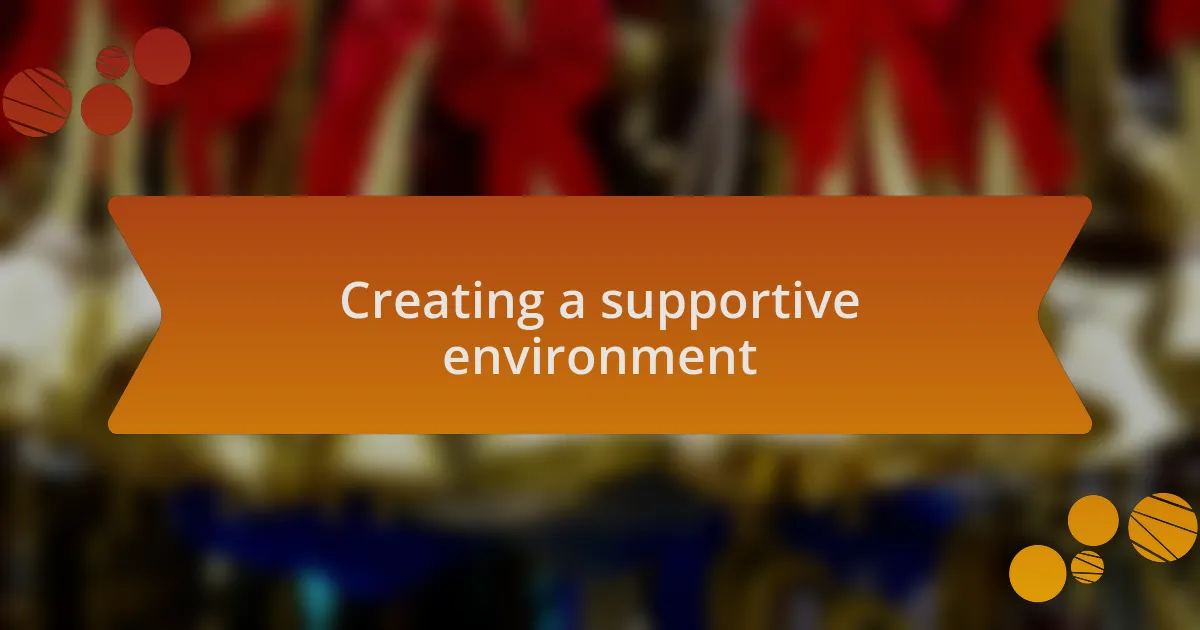
Creating a supportive environment
Creating a supportive environment is essential for minimizing performance anxiety. I often find that surrounding myself with encouraging peers makes a noticeable difference. One specific instance stands out: just before stepping on stage, a fellow musician shared a few kind words that instantly eased my stress. It reminded me how much the right words can uplift our spirits and boost our confidence—who hasn’t felt more empowered by a friend’s cheer?
Another vital aspect is ensuring that the venue is welcoming and comfortable. I remember performing at a small club where the lighting was soft, and the vibe was relaxed. It felt like stepping into a friendly embrace, allowing me to pour my energy into the music rather than worrying about the audience’s reaction. How can an inviting atmosphere transform your performance mindset? For me, it turned nerves into excitement, and I think it can do the same for you.
We also shouldn’t overlook the power of community support. During a particularly challenging gig, I asked some fellow performers to come watch. Their presence not only boosted my confidence but elevated the overall energy in the venue. I realized then that building connections with other artists cultivates a sense of belonging, reminding us we’re not alone on this journey. Have you ever felt the strength of camaraderie during a performance? It’s a game-changer, for sure.
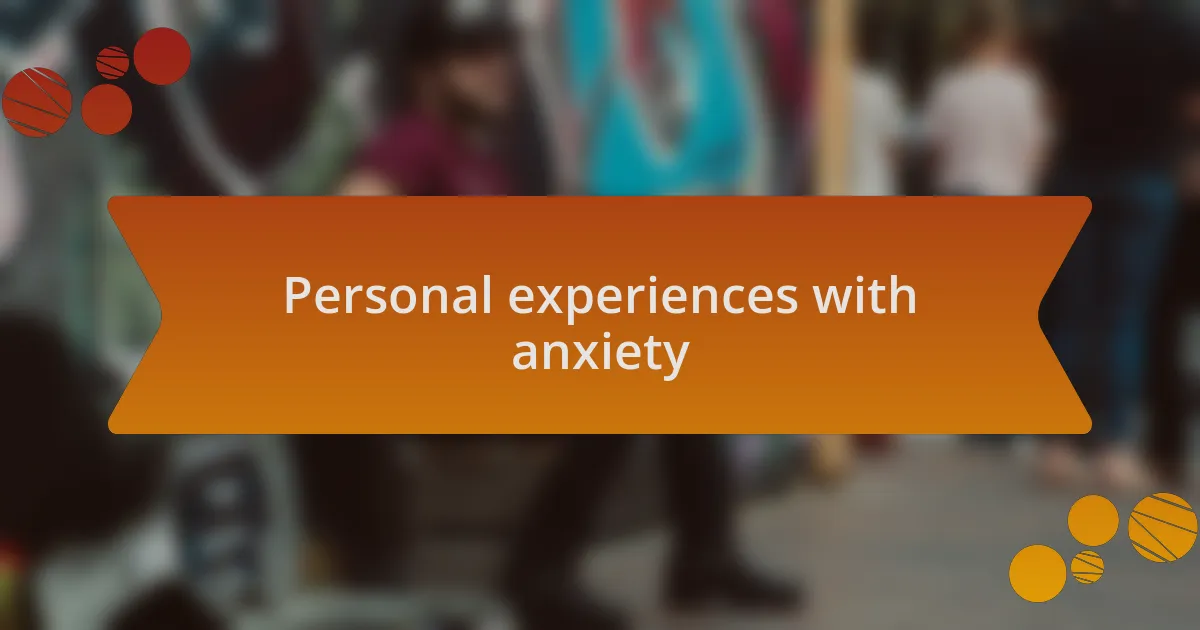
Personal experiences with anxiety
Experiencing performance anxiety is something I’ve grappled with more times than I can count. I vividly recall a night where uncertainty overwhelmed me right before my set. As I paced backstage, I could physically feel the flutter in my stomach—like tiny butterflies waging a mini-war. Did I really belong here? Yet, once I took the stage and caught a glimpse of familiar faces in the crowd cheering me on, that anxiety began to melt away, revealing a wave of exhilaration that fueled my performance.
One particularly nerve-racking show comes to mind, where the stakes felt higher than ever. Standing there in front of a packed house, my heartbeat closely resembled the pounding bass of the music. At that moment, it dawned on me: these people were here to enjoy the music, not to judge me. This realization shifted my focus from fear of failure to the shared experience of connection. Have you ever noticed how anxiety can dissipate when you remember the joy of the moment in front of you?
In my journey, I’ve learned that each performance is a lesson in managing anxiety. There was a time when I would let nerves dictate how well I played. It all changed during a casual jam session. With no pressure to perform, I found myself lost in the music and forgotten worries. It became clear that creating a relaxed mindset—a place where I could enjoy the moment—was the key to overcoming anxiety. How often do we get lost in the thrill of the music rather than the fear of judgment? From then on, I approached each show as an opportunity to connect rather than a test to pass.
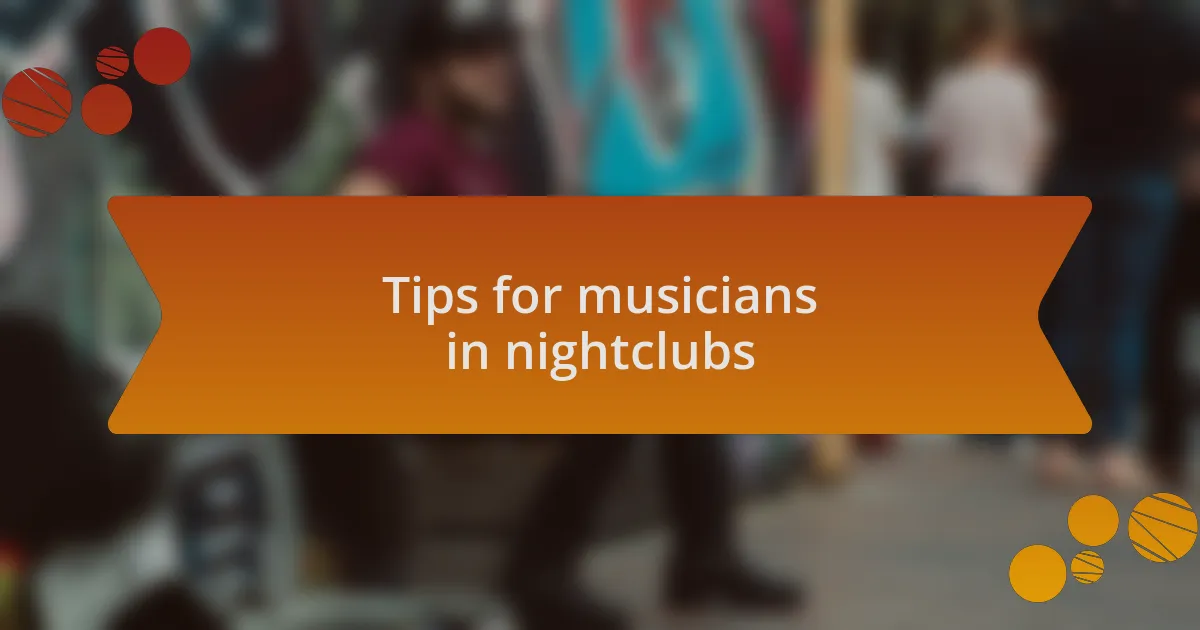
Tips for musicians in nightclubs
Taking the stage in a nightclub setting can be an exhilarating yet anxiety-inducing experience. One tip that has served me well is to create a pre-show ritual. Whether it’s a few deep breaths, some light stretching, or even a quick pep talk in the mirror, these simple actions ground me and set a positive tone for the performance ahead. Have you ever tried establishing such a routine? It can make a world of difference.
Another valuable insight is to embrace the crowd’s energy. I remember a night when the audience was particularly enthusiastic, and instead of feeling overwhelmed, I decided to feed off their vibe. I started interacting with them, asking for a cheer or a sing-along. Suddenly, I was no longer just performing; I was part of a shared experience. How often do we forget that the crowd is there to have fun and connect with you as an artist?
Lastly, I’ve found that preparing my setlist ahead of time can significantly ease pre-show jitters. Some nights, I might get caught up in the excitement and forget which songs to play. But mapping out my playlist not only helps me concentrate but also allows me to think strategically about pacing and energy flow. Think about it: when you know exactly what you’re going to deliver, doesn’t it feel as if that weight of uncertainty is lifted off your shoulders? A well-planned set gives you the confidence to focus on your performance, not just what comes next.